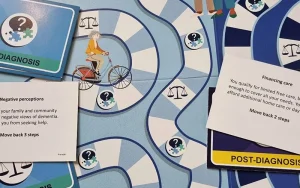A conceptual framework supporting the use of virtual reality (VR) technology as an adjuvant to traditional cognitive rehabilitation and exercise training for multiple sclerosis (MS) was presented by Kessler Foundation scientists in a recent article. They suggested that VR could enhance the effects of traditional rehabilitative therapies by providing additional sensory input, promoting multisensory integration and processing.
The review titled “Developing the rationale for including virtual reality in cognitive rehabilitation and exercise training approaches for managing cognitive dysfunction in MS” was authored by MS and exercise researchers Carly L.A. Wender, PhD, John DeLuca, PhD, and Brian M. Sandroff, PhD. It was published on April 3, 2022, as part of the Special Issue Cognitive Impairment and Neuropsychiatric Dysfunctions in Multiple Sclerosis by NeuroSci in an open access format. The authors advocate for the inclusion of virtual reality technology in cognitive rehabilitation research for MS, presenting a conceptual framework supporting the use of VR as an adjuvant to traditional cognitive rehabilitation and exercise training.
Cognitive dysfunction is a common consequence of MS that affects the daily lives of many individuals. However, current pharmacological therapies for MS are not effective for managing cognitive dysfunction. This highlights the need to explore alternative approaches for managing these disabling cognitive deficits.
Brian Sandroff, PhD, a senior research scientist in the Center for Neuropsychology and Neuroscience Research at Kessler Foundation, believes that the incorporation of VR technology in rehabilitation research and care for MS can not only improve cognition but also enhance the transfer of cognitive gains to improvements in everyday function. He anticipates that VR can increase engagement and sensory input volume significantly, and by promoting multisensory integration and processing, it can strengthen the effects of two of the most promising non-pharmacological treatments for MS-related cognitive dysfunction, cognitive rehabilitation, and exercise.
The use of virtual reality (VR) technology in cognitive rehabilitation and exercise training for MS offers a flexible and varied approach to control and progress cognitive challenges, potentially leading to stronger intervention effects, according to researchers. VR technology allows for the incorporation of cognitive rehabilitation strategies into exercise training, enabling a more direct approach to improving specific cognitive domains through exercise prescriptions. Previous research on the use of VR in stroke rehabilitation has demonstrated better motor outcomes and greater neural activation in the affected brain area compared to traditional therapy, suggesting that VR may result in more persistent gains over time.
Dr. Sandroff pointed out that while there are many conceptual advantages to using VR to treat cognitive dysfunction in people with MS, more clinical research is necessary to explore the efficacy of combining VR with cognitive rehabilitation and exercise training and its impact on daily function. Dr. Sandroff concluded that the conceptual framework presented includes examples of how immersive and interactive VR could be incorporated into MS clinical trials, forming the basis for larger randomized clinical trials.
https://www.sciencedaily.com/releases/2022/06/220630142201.htm







